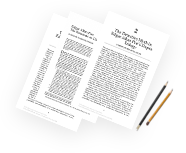Construct an argument describing the important role of privacy for shared-decision making/prevent
disease based on the patient’s health data literacy skills.
Expert Solution Preview
Introduction:
Privacy plays a vital role in shared decision-making and disease prevention based on the patient’s health data literacy skills. With the advancement of technology and the increasing digitalization of health records, it is essential to understand the importance of privacy in healthcare settings. This argument aims to highlight the significance of privacy in promoting informed decision-making and preventing diseases based on a patient’s health data literacy skills.
Answer:
Privacy is a fundamental aspect of healthcare that ensures individuals have control over their personal health information. In the context of shared decision-making and disease prevention, privacy is crucial for several reasons. Firstly, when patients are assured of the confidentiality of their health data, they are more likely to participate actively in the decision-making process. Knowing that their personal health information will be safeguarded from unauthorized access or misuse promotes trust between patients and healthcare providers.
The role of privacy becomes even more critical with regard to health data literacy skills. Health data literacy refers to an individual’s ability to access, understand, and use health information effectively to make informed decisions. When patients have a high level of health data literacy, they are better equipped to understand their own health conditions, potential risks, and available treatment options. This enables them to actively engage in shared decision-making with healthcare providers, resulting in better health outcomes.
However, for patients to fully leverage their health data literacy skills, they must feel confident that their personal health information will remain private. Without privacy protection, individuals may be reluctant to engage in discussions about their health conditions or disclose sensitive information due to fear of judgment or potential negative consequences. This reluctance can hinder effective shared decision-making and limit opportunities for disease prevention.
Furthermore, privacy in health data management is crucial for preventing diseases at both individual and population levels. By maintaining the privacy of health records, healthcare providers can conduct comprehensive analyses on aggregated data to identify patterns, risk factors, and potential disease outbreaks. This analysis can help develop targeted interventions, preventive measures, and public health campaigns to address specific health concerns. However, to gather accurate and reliable data, patients must have confidence in the privacy measures implemented by healthcare organizations.
In conclusion, privacy plays a significant role in shared decision-making and disease prevention based on the patient’s health data literacy skills. Ensuring the confidentiality and protection of personal health information promotes trust, active engagement, and informed decision-making between patients and healthcare providers. Privacy also encourages patients to develop and utilize their health data literacy skills, leading to better understanding of their health conditions and treatment options. Furthermore, maintaining privacy in health data management allows for effective disease prevention strategies and improves overall population health. Thus, it is imperative that healthcare organizations prioritize privacy while promoting informed decision-making and preventive healthcare measures.




